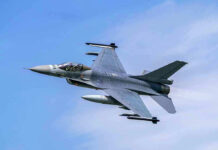
The European Union is gearing up for potential conflict with Russia, launching a new Black Sea strategy that includes military infrastructure upgrades and enhanced security measures as tensions in the region reach Cold War levels.
Key Takeaways
- The EU’s new Black Sea Maritime Security Strategy includes creating a Security Hub to protect critical infrastructure and coordinate demining operations amid escalating Russian threats.
- Infrastructure in Romania and Bulgaria will be upgraded specifically for military use, enabling faster deployment of heavy military equipment to the region.
- Russia’s invasion of Ukraine has severely destabilized the Black Sea region, with security analysts estimating a 70-80% likelihood of intensified attacks on shipping.
- The strategy is structured around enhancing security, fostering sustainable growth, and promoting environmental protection while strengthening ties with Ukraine, Moldova, Georgia, Turkey, Armenia, and Azerbaijan.
- The EU will increase monitoring of foreign ownership of ports and key facilities to prevent hostile control of critical infrastructure.
Military Mobilization at Russia’s Doorstep
The European Union has unveiled an ambitious strategy to fortify its presence in the Black Sea region, a direct response to what it views as the growing Russian threat. The comprehensive plan focuses on upgrading transportation infrastructure in EU member states Romania and Bulgaria specifically to facilitate military mobility. These enhancements will allow for quicker deployment of heavy military equipment and troops to the region, creating a more robust defensive posture against potential Russian aggression. The strategy represents one of the most significant military preparations by the EU in years, clearly indicating the bloc’s assessment of the seriousness of the situation in Eastern Europe.
“Security in the Black Sea is vital also to European security,” said Kaja Kallas, High Representative for Foreign Affairs and Security Policy/Vice-President of the European Commission.
At the center of this initiative is the establishment of a Black Sea Maritime Security Hub, designed to serve as an early warning system against threats and to coordinate protection of critical infrastructure. The hub will also facilitate demining operations, addressing the severe hazards posed by naval mines deployed during the ongoing conflict. This development comes as security analysts warn of a 70-80% likelihood of intensified attacks on Black Sea shipping, with threats ranging from direct military action to GPS interference.
Strategic Importance Amid Escalating Tensions
The Black Sea region has emerged as a crucial geopolitical flashpoint following Russia’s invasion of Ukraine. Acting as a gateway connecting Europe, the South Caucasus, Central Asia, and the Mediterranean, the waterway is vital for international trade, food security, and energy transportation. The recent destabilization has reduced the area to its lowest security point since the Cold War, with numerous incidents escalating tensions. Recent drone strikes on Russia’s Boyko Towers oil platform and attacks on Ukrainian ports have significantly increased regional volatility, creating an unpredictable security environment.
“Today we adopt a new Strategy for the Black Sea – a region of great strategic importance to the EU with many countries vying for EU membership. Against a backdrop of Russia breaching airspace, attacking ports and shipping routes, naval mines, front and centre of this work is improving security in the region. We propose a new Maritime Security Hub to strengthen our response, improvements to transport infrastructure to improve military mobility so troops and equipment can be where they are needed, when they are needed, and an intention to boost our work to counter hybrid threats, of which the Black Sea is a prime target,” said Kaja Kallas, High Representative for Foreign Affairs and Security Policy/Vice-President of the European Commission.
The EU is taking particular notice of potential vulnerabilities in its infrastructure. The strategy includes increased monitoring of foreign ownership of ports and key facilities, reflecting growing concerns about hostile nations gaining control over critical European infrastructure. This heightened vigilance aims to prevent Russia or other adversaries from establishing footholds that could be weaponized during times of tension. The approach demonstrates the EU’s recognition that economic dependencies can be exploited for geopolitical leverage.
Today, we adopt a new Strategy for the Black Sea – a region of great importance to the EU.
We’re stepping up work on security with:
🔹A new Maritime Security Hub
🔹Improved military mobility
🔹Stronger cooperation against hybrid threatsMy press conference ↓ pic.twitter.com/IrJ5ifeaAL
— Kaja Kallas (@kajakallas) May 28, 2025
Regional Partnerships and Economic Development
Beyond military considerations, the EU strategy emphasizes strengthening ties with partner nations including Ukraine, Moldova, Georgia, Turkey, Armenia, and Azerbaijan. This diplomatic outreach is designed to create a unified regional approach to security challenges while simultaneously developing economic opportunities. The plan includes the development of new energy corridors, transport links, and digital infrastructure that will connect Europe to the Caucasus and Central Asia, reducing dependence on Russian energy supplies while creating new trade routes.
“With EU Member States and candidate countries bordering its shores, the Black Sea is at our doorstep. We want to develop new energy, transport and digital corridors in the region that will connect us to the Caucasus and Central Asia. Better regional connectivity will create new opportunities for trade and businesses. It will also help diversify energy supplies away from Russia. Both Europe and our partners in the region will be more secure and benefit economically. We are intensifying our engagement and building partnerships in the Black Sea region, investing in a common future anchored in security, prosperity, and resilience,” said Marta Kos, Commissioner for Enlargement.
The strategy builds upon existing frameworks including the 2007 Black Sea Synergy initiative and the Common Maritime Agenda for the Black Sea. It is structured around three pillars: enhancing security, fostering sustainable growth, and promoting environmental protection and climate resilience. Environmental concerns feature prominently, addressing both war-related damage and climate change risks that threaten the region’s ecological balance. Through the Global Gateway Strategy, the EU plans to mobilize significant investments aimed at promoting long-term security and prosperity.
While framed as a regional security and development initiative, this strategy represents a clear escalation in the EU’s approach to countering Russia. By preparing military infrastructure, monitoring strategic assets, and building regional alliances, the EU is positioning itself for potential confrontation in what has become one of the world’s most volatile regions. The question remains whether these preparations will deter Russian aggression or inadvertently heighten tensions further in an already precarious situation.












